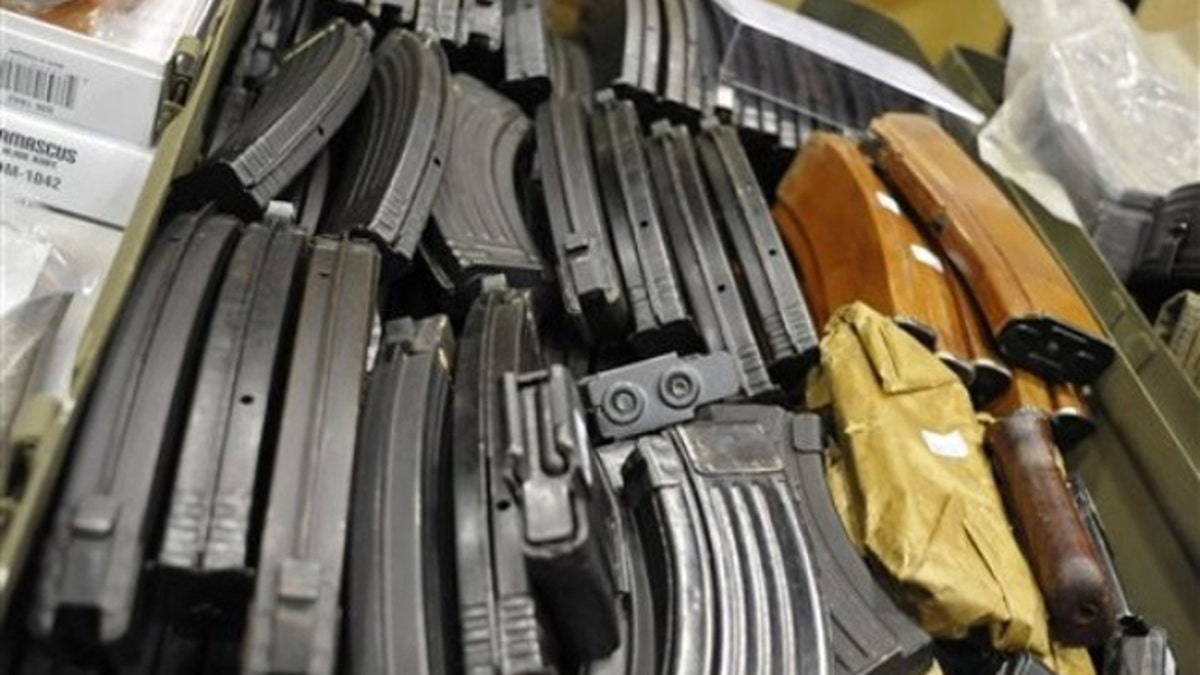
In this June 19, 2010 file photo, AK-47 assault rifle cartridges fill a box at a gun and knife show in White Plains, N.Y. (AP)
A Connecticut lawmaker wants to create the country's first state registry for people convicted of gun crimes, a proposal he says will help police track and deter repeat offenders. Opponents worry it'll be a costly, unnecessary and excessive step.
State Senate Majority Leader Martin Looney got the idea from several cities, including New York and Baltimore, which already have instituted gun-offender registries. The Connecticut Democrat, who represents a city experiencing a rash of gun violence, says early evidence suggests the established programs are having a "deterrent" effect.
"Gun-offender registry acts help combat gun violence by requiring proactive monitoring of gun offenders, which discourages them from re-offending," he testified before a state legislative committee last week.
Under his proposal, gun offenders -- either after their conviction or release from jail -- would have to provide the state with "personal information" including their address and photograph. For a period of four years, the offenders would have to update the state whenever they move and check in with local law enforcement once a year. There would be a criminal penalty for not registering.
Looney stressed in his testimony that, unlike sex-offender registries, the information would not be made public and would only be available to law enforcement. That means curious neighbors could not try to map out where the gun offenders in their community live, something anybody can do with the information found in sex-offender registries.
But Robert Crook, director of the Coalition of Connecticut Sportsmen, said he doesn't understand why law enforcement officials can't just use the information in the national gun offender database, combined with their own files, to track suspects.
"There's no reason ... why they can't do this on their own" without state legislation, he said. Plus, he said, the proposed requirements on gun offenders after they've served their time pose an unfair "imposition" on them.
Crook said he received assurances from the senator that the proposal would be limited only to select categories of violent gun crimes, but noted that he hasn't seen anything in writing.
Though the Megan's Law-inspired sex-offender registries are the most well-known databases for specific offenders, local jurisdictions have started to consider and approve other styles of registries in recent years. California has a database for arsonists. Suffolk County, on Long Island, approved the first-in-the-nation registry for animal abusers last year. Unlike the proposed gun-offender registry, this one will be open to the public.
Crook questioned where the registries would stop.
"Hell, if we're going to have a gun-offender registry, let's have a domestic-violence registry. Let's have a carjacking registry ... you can go on and on and on," he said.
But Looney, who represents the city of New Haven, has earned the support of local and state law enforcement officials at a time when some violent crime in his city is rising. According to the New Haven Register, the number of firearm-related homicides in New Haven nearly doubled, to 22, in 2010.
Looney could not be reached for comment by FoxNews.com.
According to the organization Mayors Against Illegal Guns, the registries tackle the problem of recidivism among gun offenders. The organization reported that in Baltimore, 42 percent of those charged with felony gun offenses have previous arrests on gun crimes -- Looney cited this statistic in making his case to the state Senate last week.




